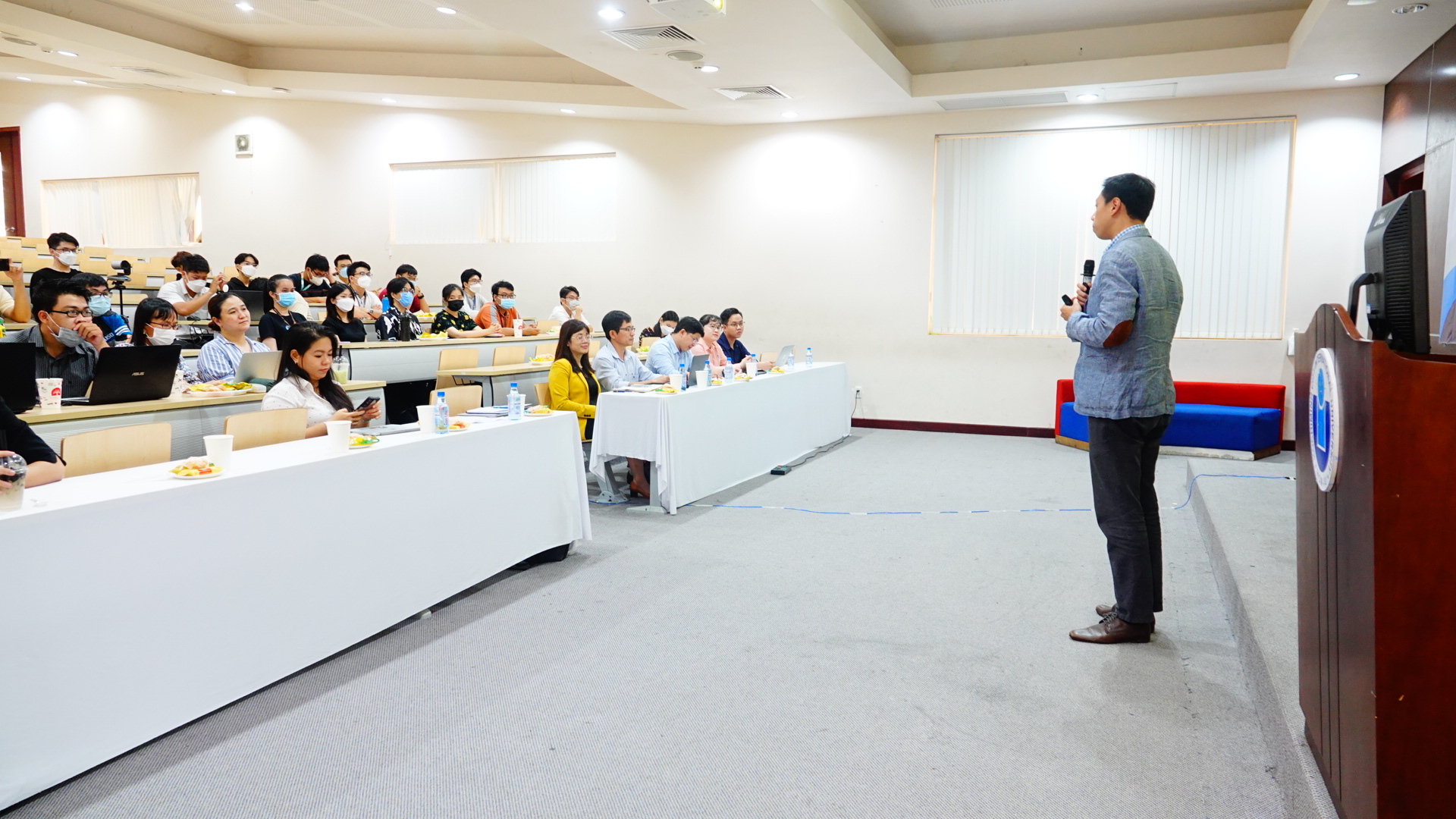
SEMINAR “THE FUTURE OF WORK: CASE STUDIES OF DIGITAL TRANSFORMATION IN ASIA”
Following the series of seminars on the topic “AI In Research and Application”, International University – Viet Nam National University Ho Chi Minh City (IU-VNU) organized the 4th seminar titled The Future of Work: Case Studies of Digital Tranformation in Asia.
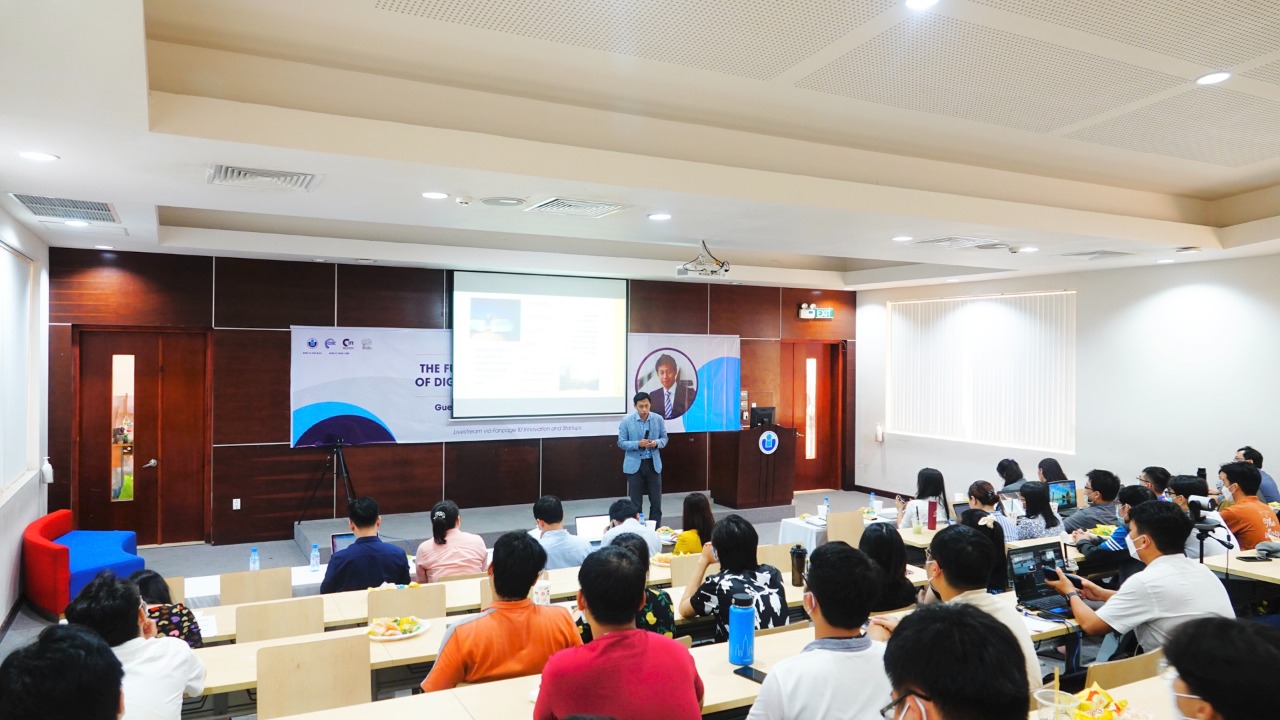
Seminar “The Future of Work: Case Studies of Digital Tranformation in Asia” with the interesting presentation of Assoc.Prof.Dr. Felix Tan – from the University of New South Wales (UNSW) Business School
The speaker of this fourth seminar is Assoc.Prof.Dr. Felix Tan – from the University of New South Wales (UNSW) Business School, home to the leading Business Information Systems faculty in Australia. Dr. Felix Tan himself has outstanding achievements in the field of Information Systems as he is the founder of the Business Research Lab on UNOVA and Asia at UNSW, and was honored as the TOP researcher in Business, Economics and Management in the Australian Annual Research Review 2021.
At the seminar, Assoc.Prof.Dr. Felix Tan informed that currently, Western universities, professors and media were still unaware of the economic and social context in Vietnam. Therefore, it was everyone’s responsibility to find ways to share the success stories of technology business and digital transformation in Vietnam with the world. If we could do this, we would attract more investment and commitment from abroad, and create many job opportunities not only in Vietnam but also in the world. This is an important goal that he and UNSW hope to achieve through working with IU.
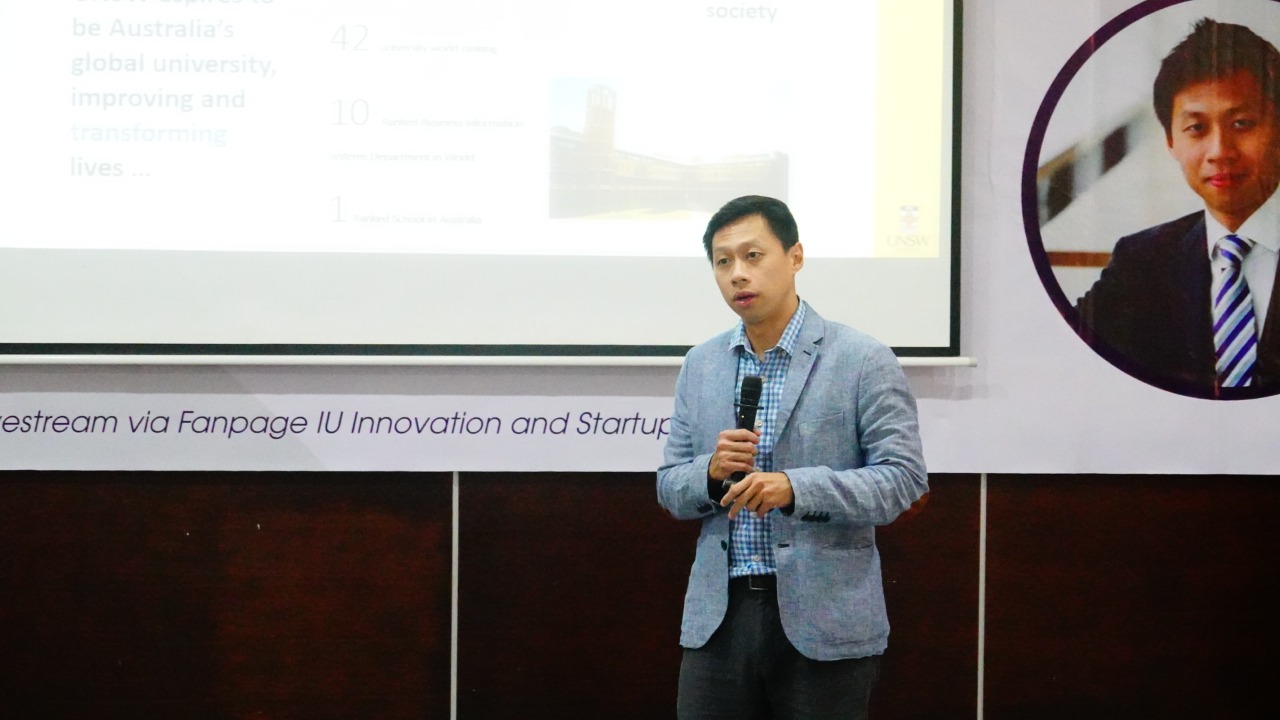
Assoc.Prof.Dr. Felix Tan presented content related to the story of digital transformation at present and in the future
In addition, Assoc.Prof.Dr. Felix Tan also wishes in the future we will have a common environment where we can share the latest knowledge and its meaning. Dr. Felix Tan hopes that UNSW and IU can learn from each other, thereby developing products and finding better solutions to problems in society to serve the community. “We look forward to working with IU so that we can share our knowledge and technology through this medium.” Mr Tan said.
According to Assoc.Prof.Dr. Felix Tan, case studies are usually reports on a phenomenon, a project, or a proposal of a company that are written down or rewritten to make it easier to understand when the phenomenon, project, or proposal seems to be unclear. Mr. Tan emphasized: “Case study is one of many research methods. Yet, we choose case study to make it easier for the community to understand technical concepts. For example, when talking about AI, blockchain, machine learning, other professors will explain those concepts to their own understanding whereas businessmen will understand in a different way. Therefore, case study is the method of taking these data, synthesizing them, and rewriting them so that everyone can understand.”
The main topic that Mr. Tan explores is Digital Transformation in Asia. Why does he name the Workshop “The Future of Work”? The answer is work, leisure and even social life are now dominated by technology. An average person spends more than 5 hours a day on the phone. So the future of work and leisure has changed a lot and this change has been accelerated by the recent pandemic. Before the pandemic happened, very few people knew Zoom and Team. But obviously a lot of technology applications have been born to support us to work during the pandemic that is the future of work – “The Future of Work”.
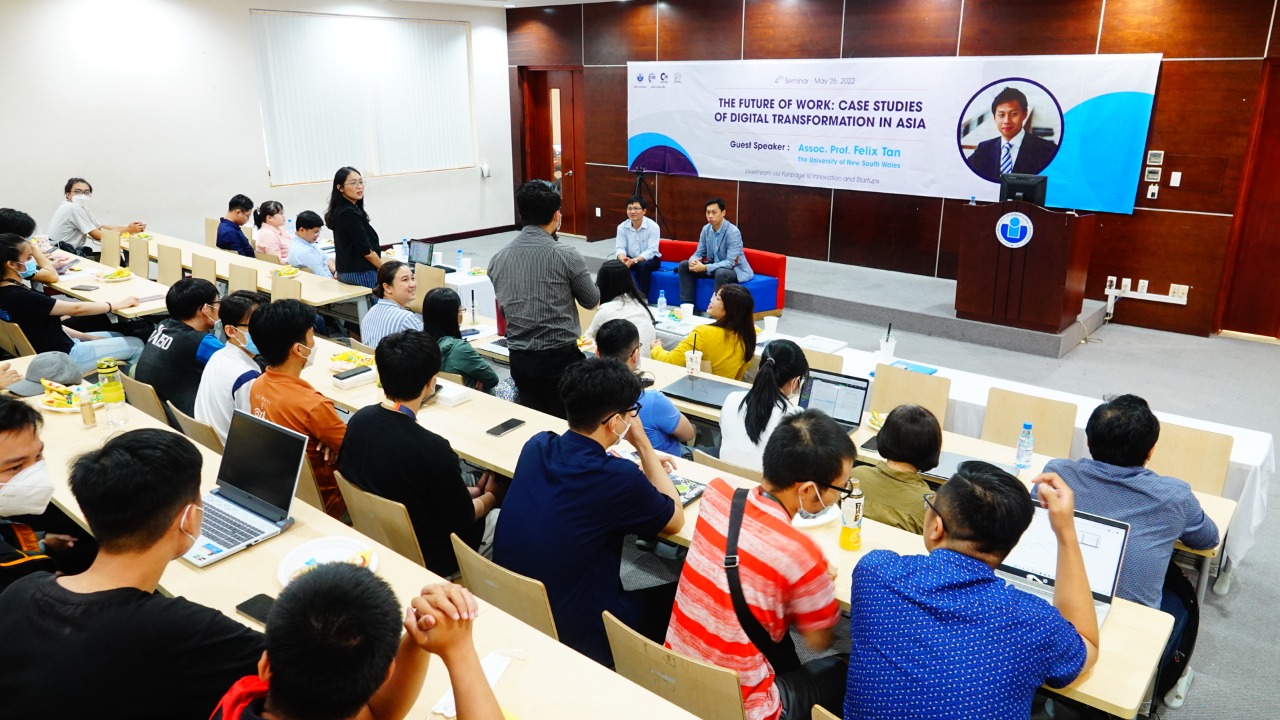
The seminar raised challenging questions and issues of the Internet and technology era, especially the story of AI, which attracted great attention from IU’s students
So what is digital transformation? One of the main characteristics of digital transformation is change, which can be for the better or worse, because technology always has two sides: positive and negative. For example, Facebook is a tool that connects people, but it can become a platform for fake news or fake advertising. Certainly, these negative effects were not the original intention of Facebook founder. So, as users, it is our responsibility to consider both the pros and cons of technology, understand the consequences, and find solutions for the future.
In addition to focusing on case studies, other professors from UNSW also look at multisided platforms such as Gojek, Grab, E- bay, etc., which are platforms that connect sellers and buyers (sometimes even government intervention) and is driven by technology. “For example, entering Shopee headquarters, you will see thousands of programmers sitting next to each other, operating and maintaining this platform” – Assoc.Prof. Dr Felix Tan shared at the seminar.
Talking about the future, Assoc.Prof.Dr. Felix Tan said there will be an explosion of creative content. There have been many revolutions in
this area, for example in Korea, KOLs are grouped together and trained to become celebrities. Another special feature is that Korea can put their cultural identity into cultural products, which is very difficult. There is a whole ecosystem behind it, including entertainment agencies, intermediaries, agents and the government.
The workshop also shared that the adoption of new technology can bring negative results contrary to the original plan. Another point is that if a new technology platform wants to penetrate foreign markets, it is necessary to understand the local customs and make sure not to bring their own prototype into the host country. The most typical example is Uber being knocked out of Vietnamese market by Grab for not building features according to Vietnamese characteristics, or Gojek which was extremely successful in Indonesia because they brought locality into their products. From there, they retain a loyal mass of users and attract more investors. Thirdly, it is necessary to take advantage of intermediaries. These middlemen have a lot of local connections. In fact, they know where their hometown is soit is important to support and pull them on our side. Finally, it is vital to build your platform based on users’ need.
Assoc.Prof.Dr. Felix Tan affirmed: “Each of us should write our own story. Working with lecturers, professors or even your friends can help you talk about tech startups and technical innovations in Vietnam. At the same time, keep chattering and sharing your ideas.”
In addition, the UNSW lecturer also brought some good news at the end of the Workshop. Next September, UNSW will hold a networking event with IU, he will return to IU and talk more about future work, current trends, what to do as a young entrepreneur, how to look for opportunities and where the challenges are.
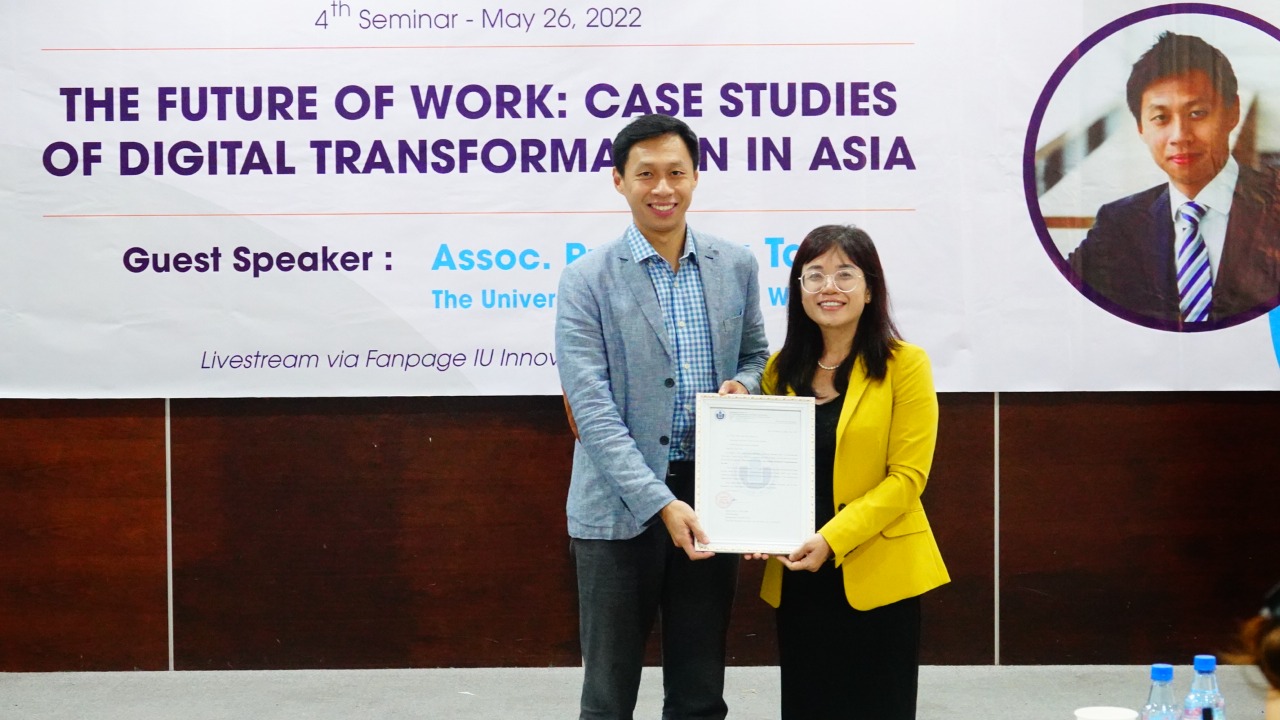
Dr. Tran Ngoc Diep – Head of Center for Innovation and Technology Transfer, International University gave the certificate of appreciation to Assoc.Prof.Dr. Felix Tan
Assoc.Prof.Dr. Tan also took time to encourage IU’s 2nd and 3rd year students to start looking for projects or develop their own projects, whether only at the school or local level. Other academic skills won’t attract employers as much as project experiences. Mr. Tan also expressed his joy and support when he heard about the recently held ‘IU Startup Demo Day’ contest.
The series of seminars ‘AI in Research and Application’ was organized to provide students with useful knowledge about digital transformation and application of artificial intelligence (AI).
| And what problem are they solving? If you want your platform to be successful, you need to find and solve the fundamental problems that a person is facing – this is called “user-centric design”. One of the huge problems of ASEAN is the lack of financial participation. For example, I was born in Singapore and lived in Australia for 31 years, so I understand the importance of a bank account. I deposit, borrow and invest money, all from a bank account, which is a form of ‘institutionalized banking’. Many people in rural Southeast Asia (SEA) are not familiar with “institutionalized banking,” meaning they are not involved in the country’s financial ecosystem and therefore do not access and use products from the above system, but instead, they have their own financial model in the community. Examples are the “microsaving model” or working with a lender (middlemen). These models are called “non-institutionalized banking” and leave many adults in Southeast Asia without their own bank accounts. This can lead to consequences such as women’s reliance on the pure labor of men, leading to the patriarchy system.
So what changes have been made to the above problems by the rise of some e- commerce companies? The boom of e- commerce platforms has been accelerated in the past 10 years in Asia. For example, the term “O2O” (online to offline and offline to online) means that something you buy online is of the same or better quality as the item you buy directly from retails. Delivery speed is also faster and online platform even has KOLs to guide or recommend what to buy by live streaming. All these forms are called “New Retail System”. Technology companies are investing heavily in this area. For example, online sales people are hired and paid as a full-time employee to sell a specific item to a specific group of customers. And so the Tiktokers, Youtubers may one day receive a phone call from an agency and be hired to sell products. In addition, technology helps to reduce operating costs, rents, gasoline, and stimulate higher shopping demand in the form of “network buying”, which means buying a group of items altogether. E-commerce platforms dominate the business and capital investment in the financial technology but these trading platforms live off of credit cards/e-wallets. They work because of the needs of users to transfer money online. In Indonesia, for example, credit card and e-wallet companies have more influenxe than e-commerce platforms. They really help lower-class people, freelancers without legal work contracts. These payment methods provide a way to connect and pay these people even if they don’t have a bank account. Thus, changing social stereotypes, helping women transact money online or disrupting the traditional ways that companies serve customers; at the same time changing the concept of money when only few people use cash or wallets. Assoc.Prof.Dr. Tan – USNW |